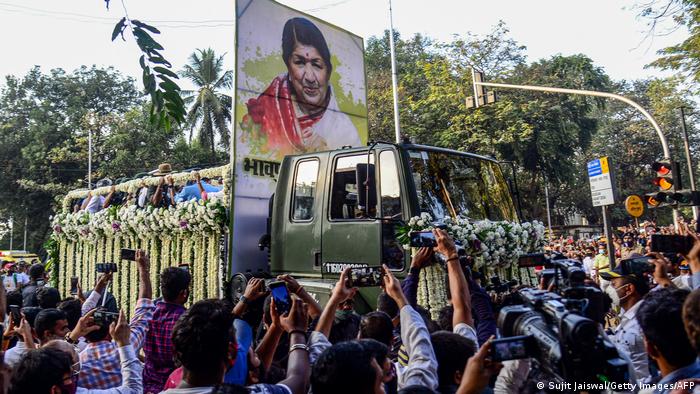

There was a time when Indian music was identified with multiple personalities. Being a country that survives on diversity, the favourites would change with region, language, economic status, and demographic profiles. And also, religion.
And then there was Lata Mangeshkar. Yes, even the classical doyens were unanimous in agreement. Bade Ghulam Ali’s oft quoted statement – ‘Kambakth Kabhi Besuri Nahi Hoti, Wah Kya Allah Ki Den Hai’ was not apocryphal. It is something that the Hindustani Classical fraternity, often fighting internecine wars, would have nothing against. Interestingly, Lata never sang pure classical music. Hers was a genre considered cheap by people who mattered. Only to eat their words, as was the case with B V Keskar, whose banning of film songs found an opportunity for the birth of Radio Ceylon.
How does one go about writing about Lata Mangeshkar? She started singing on the stage at the age of 9 and went on till her last well-known recording happened at the age of 89, a stretch of 80 years, a record few will ever emulate. Not to forget that by the age of 20, she was possibly the country’s most well-known singing voice, with listeners sending postcards to the AIR asking for the name of the singer of Aayega Aane Wala (Mahal, 1949). And by the time she was in her mid-twenties, she was everybody’s favourite. Composers would consider themselves blessed to record with her. Everybody was hit by the Lata mystique, in as much, even O P Nayyar, the only famous composer of the Golden age of Film music who never sought her musical services would mention that Lata and composer Madan Mohan were a combo which had no peer. Musicians would proudly flaunt their credentials of playing with Lata. A few songs by Lata would act as a security blanket for the producer. Heroines, from the sanctimonious to the spirited would insist on Lata being their playback, and some would have it on the contract as well. And it was not just because she had a wonderful voice. It was also because she created a style that was completely her own. It was modern yet had the traditional touch. With Lata behind the mike, nasal twangs and forcing of emotions were things of the past. No longer the ‘desi Noorjehan’, she was the perfect natural. She was the voice of a new India, where melancholy could be embodied in soft but bold notes, where the high notes need not be weepy or screechy. She was probably the first female singer in Hindi cinema who made a habit of hitting notes in a manner very straight, avoiding the meend. No wonder her voice was described as pitch-perfect, flawless enough for tuning string instruments. While the suppleness of her voice came down marginally in the early 1960s after she suffered from bouts of sinusitis, the age-old adage probably came to her rescue. Form is temporary, Class is permanent.
So, while the next two decades witnessed batons changing hands, Lata Mangeshkar remained a preferred singer. There are stories of her involvement in broken relationships and acrimony-laden fights. Unfortunately, a lady’s personal life is often scrutinized threadbare, forgetting that navigating through an industry that can be better defined as a Cretan maze is no mean task. Expounded none better than her favourite colleague, Kishore Kumar. Whose admiration for her dedication was profound. There is little to demarcate between a Lata Mangeshkar recording and a stage show. She would precisely replicate the notes and nuances. Also, her expertise at singing in multiple languages with unfailingly good diction spoke volumes of the student in her, how eager she was to internalise emotions in dialects alien to her own, Marathi, Konkani, and Hindi.
For the last few years, there have been multiple shouts of Lata Mangeshkar being on the deathbed. A few premature obits had been written and parked for release when she was sick a few years ago. The media, it seems, was hungry for news. And her death was a much awaited one. It was probably divine intervention that Goddess Saraswati, on the day of her journey back to her celestial aboard, chose to take her best disciple and friend along. Call it poetic justice.
(This article was originally published in Economic Times. This is the original article link.)
Author info is not available!